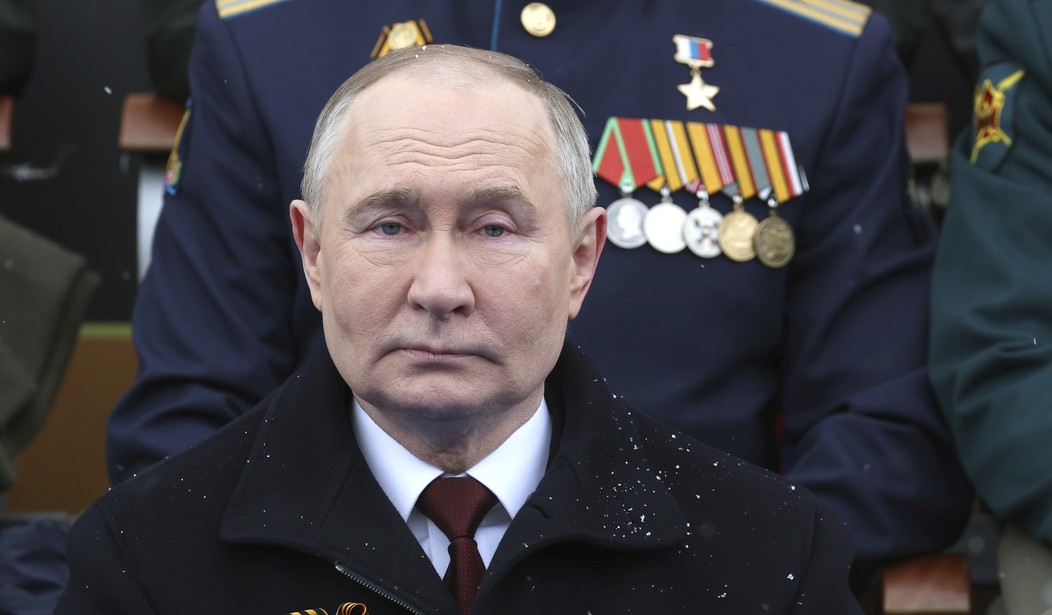Russian President Vladimir Putin ruffled some feathers inside his own country this weekend when he appeared to dismiss the recent Ukrainian incursion into the Kursk Oblast inside of Russia as having had "no effect" on the overall war. He insisted that the primary objective of the war had been to retake and fortify annexed lands, primarily in the eastern Donbas region, and that Ukraine's actions in Kursk had actually hastened Russia's success there. Meanwhile, Ukraine's top military commander was marched out to counter those claims, saying that the invasion of Kursk was "working" and that Russia had made no new advances in the eastern oblasts. All of this is part of a public relations campaign more than any of the actual battles taking place, but it demonstrates that the situation in Ukraine remains complicated and there still doesn't appear to be any path toward a negotiated peace agreement on the table. (The Guardian)
Vladimir Putin on Thursday said his main aim in Ukraine after 30 months of fighting was to capture the eastern Donbas area. The Russian offensive in February 2022 failed in its expansive goal to capture the Ukrainian capital, Kyiv, in the west, and Moscow has been unable to take full control of its supposedly annexed oblasts – administrative regions – of Luhansk and Donetsk in the geographical Donbas region.
Putin claimed the Ukrainian offensive in Russia’s Kursk region had no effect, and that by bringing “quite well-prepared units” into Kursk from elsewhere, Ukraine had made Moscow’s advance in Donbas quicker. “The enemy weakened itself in key areas, our army has accelerated its offensive operations.”
Ukraine’s top military commander, Oleksandr Syrskyi, countered Putin’s narrative in an interview broadcast on Thursday, saying the Kursk incursion was working and that there had been no Russian advances on Pokrovsk, a key sector of the Ukrainian front, for six days. “The enemy hasn’t advanced a single metre in the direction. In other words, our strategy is working,” he told CNN.
Any student of warfare from nearly every era of mankind is well aware of the importance of propaganda when fighting a war and that's what we're seeing here. Putting out positive information - regardless of its veracity - is critical to the war effort. When you lose the faith of your own people, you have essentially lost the war. Propaganda is harder to sell in the modern era of 24/7 news coverage and embedded journalism, but that doesn't stop the leaders of the countries involved from trying, including here in the United States.
What both Putin and Zelensky are doing here may prove a bit risky. There is definitely an element of "ouch" for Putin to essentially write off the Kursk Oblast as being insignificant. It's true that the region is comprised largely of farmland of no strategic military value, but I imagine that it's quite important to the farmers who live there. That's particularly true now that harvest season is upon us. But they are also highly unlikely to rise up in force against their own government in Moscow so they may simply have to wait longer for the cavalry to arrive.
What Ukraine's Oleksandr Syrskyi said in response, however, was not just a case of positive spin or cheerleading. He claimed that there had been "no Russian advances on Pokrovsk" and that Russia had not advanced "a single meter" to the west. That's not propaganda. That's an outright lie. As we covered here recently, Russia used the Kursk incursion as a ruse to appear as if they were temporarily pulling back, "setting a trap" that the Ukrainian military walked right into. More than half of four Ukrainian battalions were wiped out and hundreds more troops there surrendered en masse. Russia took the city, or at least what was left of it.
Zelensky has fired a number of his military commanders and reshuffled others across the board. He continues to make efforts to blunt the Russian offensive, which is to his credit. But most military analysts seem to agree that the incursion into Kursk has produced little aside from some positive headlines to run in the Ukrainian press back home. Meanwhile, Russia continues to make measurable advances on the eastern front. That's where Vladimir Putin's focus remains. When he achieves those objectives (whatever they turn out to be), he will be able to return his attention to Kursk and Russia will almost certainly drive them back out of the country in short order Propaganda is a part of any war fought by mankind, but no war can be won with propaganda alone.







Join the conversation as a VIP Member